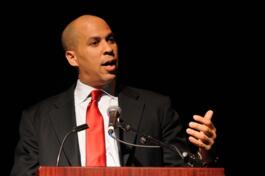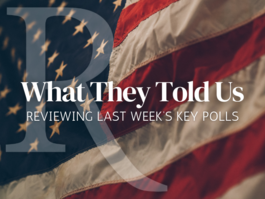Why Cory Booker Got Bain Capital So Wrong
A Commentary By Joe Conason
Cory Booker's emotional televised plea to "stop attacking private equity" may have been the single greatest service he could perform for the Romney campaign. His immediate attempt to revise his remarks on behalf of President Obama, for whom he is supposed to act as a surrogate, only highlighted his earlier insistence that the harsh campaign criticism of Bain Capital, which he specifically defended, is "nauseating."
But the Newark mayor's feelings must be influenced by his own relationship with Wall Street, private equity and Bain. America's financial titans have been very, very good to him.
Although Booker undoubtedly knows that Bain is fair game -- as he later acknowledged, going so far as to accuse Mitt Romney of "not being completely honest" about job creation there -- his initial remarks were obviously sincere. He tried to equate negative advertising about Bain with the Republican disinterment of the embarrassing Rev. Jeremiah Wright, and went on to denounce the impact of "this unbelievable amount of campaign cash that's eroding, in my opinion, the democracy, but more important, pulling our campaigns in the gutter."
Even a cursory examination of Booker's own political history shows, however, that he has never hesitated to use negative advertising against his opponents, when necessary -- and that his own remarkable rise to power in Newark was funded by overwhelming infusions of cash to pay for those ads.
The first time he ran for mayor and lost in 2002, Booker was heavily outspent by then-Mayor Sharpe James -- later sent to prison in a federal corruption probe -- but managed to raise and spend almost $2 million, much of which he used on ads attacking the incumbent. Four years later, thanks in part to "Street Fight," a superb documentary film about the first race that might be considered the longest negative ad in history, Booker won easily, with a massive $6 million war chest against a struggling opponent who raised less than $200,000.
When Booker ran for his second term in 2010, he faced token opposition but raised more than $7.5 million, largely from the same Wall Street and private equity financiers that have always been his primary source of outside support. Glancing at his campaign filings from that race, it is easy to find not only major donors from Bain and other private equity firms, but big Romney backers such as Julian Robertson of Tiger Capital Management and Paul Singer of Elliot Capital Advisers, each of whom has given the Republican candidate at least $1 million in this cycle. Both Robertson and Singer gave the maximum $26,000 to Booker's campaign.
Among the Bain Capital donors to Booker's 2010 campaign were Joshua Beckenstein, who also gave the maximum $26,000, and Jonathan Lavine, who gave $25,000. Other top donors included members of the Curry family, who run Eagle Capital Management (and close relatives of Marshall Curry, the director of "Street Fight") and gave a total of $78,000. The full list, which also includes large donations from executives at Goldman Sachs, Citigroup and Morgan Stanley, can be found here.
Surely Booker is aware of the costs as well as the benefits of private equity -- and its mixed record as an engine of job creation. He is far too smart and experienced to misunderstand private equity's true purpose, which is to create wealth, not employment. And Booker certainly knows that when Romney presents himself as a businessman who can revive America's fragile economy, it is fair to mention how Bain profited from loading up companies with debt and ripping off the proceeds while laying off thousands of workers.
But whatever he says about capital, the Newark mayor also knows that it takes a lot of money to win public office, like the U.S. Senate seat that may be in his future. What everyone else should know is that he expects to raise that campaign money from the same people and firms that have backed him from the beginning.
Henry Decker contributed to this column.
Joe Conason is the editor in chief of NationalMemo.com.
COPYRIGHT 2012 CREATORS.COM
See Other Political Commentary.
See Other Commentary by Joe Conason.
Views expressed in this column are those of the author, not those of Rasmussen Reports. Comments about this content should be directed to the author or syndicate.
Rasmussen Reports is a media company specializing in the collection, publication and distribution of public opinion information.
We conduct public opinion polls on a variety of topics to inform our audience on events in the news and other topics of interest. To ensure editorial control and independence, we pay for the polls ourselves and generate revenue through the sale of subscriptions, sponsorships, and advertising. Nightly polling on politics, business and lifestyle topics provides the content to update the Rasmussen Reports web site many times each day. If it's in the news, it's in our polls. Additionally, the data drives a daily update newsletter and various media outlets across the country.
Some information, including the Rasmussen Reports daily Presidential Tracking Poll and commentaries are available for free to the general public. Subscriptions are available for $4.95 a month or 34.95 a year that provide subscribers with exclusive access to more than 20 stories per week on upcoming elections, consumer confidence, and issues that affect us all. For those who are really into the numbers, Platinum Members can review demographic crosstabs and a full history of our data.
To learn more about our methodology, click here.



